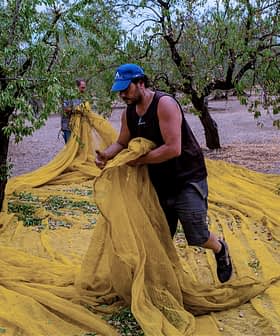UN Issues New Standards to Curb Spread of Xylella
Updated fumigation standards, new ground rules for international trade in agricultural products and the development of new technologies to screen plants and plant products for diseases were among the standards approved by the body.
 Photo courtesy of ©FAO/Giulio Napolitano
Photo courtesy of ©FAO/Giulio NapolitanoAt a recent meeting in Rome, the international body responsible for preventing the spread of diseases and implementing safe plant trading practices met to adopt new standards meant to curb the spread of Xylella fastidiosa, as well as five other pest-borne diseases.
The standards that the Commission on Phytosanitary Measures (CPM) agreed to implement included protocols to block the spread of invasive pests, such as the olive fruit fly, from crossing international borders.
Many farmers and governments grapple with warding off highly destructive pests and diseases that are — on top of everything else — also new to them.
“With increased trade and travel, the risks of plant pests spreading into new areas across borders is now higher than ever before,” Bukar Tijani, the assistant director general of the United Nations Food and Agriculture Organization’s (FAO) Agriculture and Consumer Protection Department, told the gathering.
“Each day, we witness a shocking number of threats to the well-being of our plants and, by extension, to our health, environment and economy,” he added.
See Also:Xylella fastidiosa NewsThe FAO, which runs the commission, estimates that Xylella fastidiosa has been responsible for the destruction of hundreds of thousands of acres of olive trees across the Americas, Europe and Asia.
In Italy alone, it is estimated that the disease has destroyed 445,000 acres of olive trees, costing millions of Euros of damage. Xylella fastidiosa has also infected olive trees in both Spain’s Balearic Islands and France. The disease has also been identified on Spain’s mainland, but so far only in almond and cherry trees.
According to a study recently released by the University of Málaga, there is also concern that the disease could spread to Africa, Australia and parts of East Asia as well.
Overall, the FAO estimates that between 20 and 40 percent of annual global crop production is lost to pests. This, along with other plant diseases, costs the global economy about $290 billion each year.
“Many farmers and governments grapple with warding off highly destructive pests and diseases that are — on top of everything else — also new to them,” Tijani said.
The new standards, which will be adopted by the CPM and their subcommittee in charge of setting and implementing global phytosanitary standards, the International Plant Protection Convention (IPPC), included setting universal guidances on the use of fumigation; implementing diagnostic protocols for correctly identifying invasive plant pathogens and reacting accordingly; setting standard ground rules for international trade in agricultural goods; developing new technologies to more effectively screen plants and plant products for diseases; and reducing the risk of transporting plant pests via sea containers.
However, the FAO warned that listing new standards alone does not solve the problem. Governments, farmers and exporters must also be willing to invest in implementing solutions and working together to prevent the spread of diseases, such as Xylella fastidiosa.
To highlight the pervasive problem of invasive pests in the global food supply chain, the U.N. General Assembly announced that 2020 will be the international year of plant health.
“Despite the increasing impact of plant pests, resources are scarce to address the problem,” Jingyuan Xia, IPPC’s Secretary, said “The CPM meeting will discuss how the international year of plant health could trigger greater global collaboration, engagement and awareness to support plant health policies at all levels.”
In the spirit of announcement, Angelo Annese, the mayor of Monopoli, a town in Italy’s southern region of Puglia that has been combating the spread of the disease for more than a year, pledged €40,000 ($44,900) to combat Xylella fastidiosa on Friday.
“Public and private entities are obliged to take strategic action to combat the development of the insect population by adopting the most suitable phytosanitary measures,” Sante Scarafino, a spokesman for the city council said in a statement.






